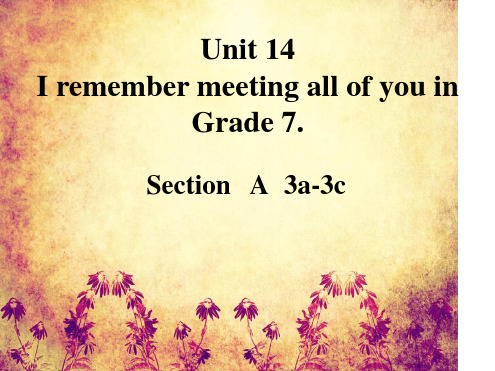人教版九年级英语下14.5
- 格式:doc
- 大小:44.00 KB
- 文档页数:3






九年级人教版英语unit14知识点Unit 14: Knowledge Points in the Ninth Grade People's Education Press English TextbookUnit 14 in the ninth grade People's Education Press English textbook focuses on various grammar points and vocabulary words that are essential for students at this level. In this article, we will explore some of the key knowledge points covered in this unit.Firstly, this unit introduces the concept of reported speech. Reported speech, also known as indirect speech, is when we report what someone else has said without using their exact words. For example, if someone says, "I love to read," in reported speech, we would say, "He/she said that he/she loves to read." It is important to remember the changes in pronouns, tenses, and time expressions when converting direct speech to reported speech.Next, the unit delves into the usage of modal verbs. Modal verbs, such as can, may, must, should, etc., are used to express ability, possibility, necessity, and advice, among other things. For instance, "You should study for your exams" suggests advice, while "I can swim" indicates ability. Understanding when and how to use modalverbs correctly is crucial in conveying the intended meaning of a sentence.Moreover, Unit 14 covers the topic of adverbial phrases of condition. Adverbial phrases of condition are used to express a specific condition under which something happens. Examples include "as long as," "unless," "in case," "provided/providing that," and "on condition that." These phrases are vital in expressing various conditions and requirements in both spoken and written English.In addition, this unit explores the use of the passive voice. The passive voice is used when the focus is on the action being done rather than the doer. For instance, "The book was written by Mark Twain" is in the passive voice, while "Mark Twain wrote the book" is in the active voice. Understanding the passive voice and when to use it correctly is an essential skill in English writing and comprehension.Furthermore, this unit introduces the topic of complex sentences. A complex sentence is a sentence that contains an independent clause and one or more dependent clauses. Dependent clauses cannot stand alone as meaningful sentences. For example, "Although it was raining, they still went for a picnic." Here, "Although it was raining" is the dependent clause, and "they still went for a picnic" is the independentclause. Knowing how to construct and use complex sentences enhances the richness and variety of one's writing.Lastly, Unit 14 covers a range of vocabulary words related to various topics such as food, travel, hobbies, and health. Learning and expanding one's vocabulary is crucial for effective communication. It enables us to express ourselves accurately and precisely.In conclusion, Unit 14 in the ninth grade People's Education Press English textbook covers important knowledge points in grammar and vocabulary. By understanding and applying these points, students can enhance their language skills and effectively communicate in English. Whether it be reported speech, modal verbs, adverbial phrases of condition, passive voice, complex sentences, or vocabulary expansion, each topic plays a significant role in developing a comprehensive understanding of the English language.。
安边中学九年级下学期英语学科导学稿执笔人:王伟红总第13 课时备课组长签字:包级领导签字:班:组:学生:上课时间:
集体备课个人空间课题:Unit 14 Have you packed it yet? Period 5
学习目标
复习目标:
1. Words:
bathing,suit,towel ,water ,guidebook,refrigerator,garage chop
wood,light ,we,ll farm ,anyway
2.Phrases:bathing suit,clean out ,get back to sb
3.Sentences: 1) Have you watered the plants yet ?
No,I haven’t.
2) Have you packed the camera yet ? Yes. I’ve already
put it in my suitcase .
3)Have you fed the cat ? N o,I haven’t fed her yet .
4.Grammar:现在完成时态的构成和用法
三、教学过程
【自主预习】
1)clean out ____________ 2)in a minute __________
3)get back to sb______ 4)take the dog for a walk __________
5)light the fire for breakfast 6)挑水___________
7)和他聊天_____________ 8)砍柴
9)在城市观光兴___________10)be off _______
11)beach towel ______ _ 12)in a minute ________
13)turn off ______ 14)be sure to do sth.__________
15)in the last twelve months______________
【合作探究】
帮你学
1.让我们注意一下since 和for的用法:
for的后面接一段时间:
I have lived in Beijing for about 12 years. 我在北京已经生活了大约12年
了。
since后面接点时间:
I have lived in Beijing since 1994. 我从1994年就一直住在北京。
2.must 和have to的区别:
have to是“不得不”,表示客观上的意义;而must是“必须”,表示主观愿
望,如:
It’s time for the meeting. I have to go now. 开会的时间到了,我得走了。
否定句,助动词do + not +have
You don’t have to go.你现在不必走。
You must be there你务必按时到达那里。
否定句, 直接+not
You mustn’t go there now. 现在你千万别上那儿去。
must 的否定回答needn’t
Must I go now? 我现在就得走吗?
Yes, you must. 是的,你必须走。
【检测训练】
单项选择:
1. Please go to the station to _______when the train to Kunming starts to
leave.
A. find for
B. look for
C. find out
D. find
2. Mr. Green is very rich. He ______ his dog _______ meat.
A. feed;with
B. feeds ;with
C. feedes ;with
D. feed ;in
3. _______ have you been in China?
A. How long
B. How often
C. How soon
D. How far
4. He does business in Shanghai. He ______ Shanghai the day after
tomorrow.
A. leaves for
B. is leaving for
C. left to
D. is leaving to
5. He _______carefully but he could not _______ his teacher clearly.
A. heard; listen
B. listen; hear
C. listened; hear
D. heard; listened
6. He kissed h is wife and then ______ goodbye _______ her when he left
home.
A. say; to
B. said; to
C. spoke; to
D. said; with
7. We need friends to_______, or we will feel _______.
A. chat; alone
B. chat with; lonely
C. spoke lonely
D. talk with; alone
8 This story ______ tells us how Bill Gates becomes successful.
A. mostly
B. mainly
C. most
D. A and B
9. Many students have never been to China before and ______ any Chinese.
A. could hardly say
B. can hardly talk
C. can hard speak
D. can hardly speak
反思栏。